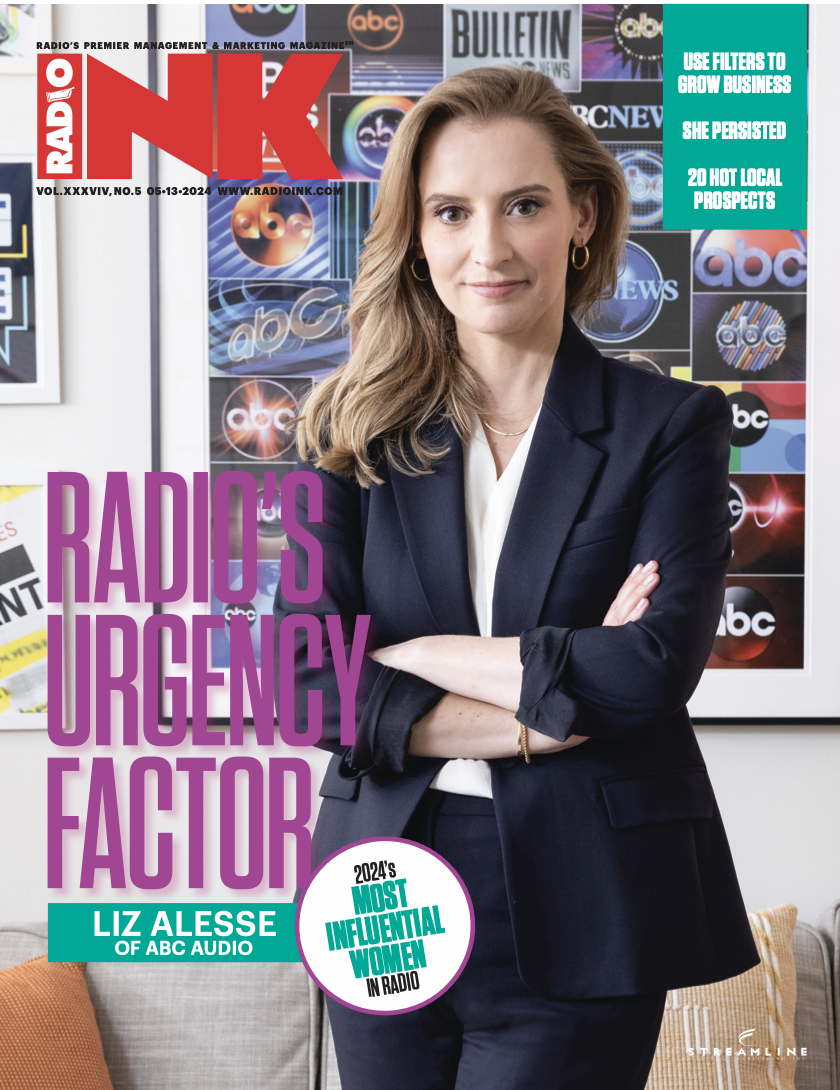
Radio, like most other industries in the world, is set to be revolutionized and forever changed by artificial intelligence. Now that the initial shock of AI’s widespread emergence over the past year has begun to settle, what should radio start to focus on beneath the surface of this technology? Is it the fear of AI? Education? Regulation?
To discuss these second-layer questions, Radio Ink had a conversation with Futuri Media Founder and CEO Daniel Anstandig.
Radio Ink: What is the biggest misconception with all the information that’s out there? What do you find is the biggest misconception about AI you find in the radio industry?
Daniel Anstandig: I think the biggest misconception overall about AI is that it will wake up, automate all jobs, and make humans obsolete. I think that it’s a misconception that AI is here to evolve beyond our control. Look, even RadioGPT, which is a full end-to-end AI-driven solution for broadcasters, is best used when it’s surrounding humans on the air. It’s best used when it’s extending who we are as live and local brands in ways that we’re not currently doing.
For broadcasters who think first about who they can replace or what they can replace, that’s not the best way to start thinking about AI. The first questions that we should ask are, “Where do we need to extend ourselves and where do we need to create more live and local content? Where do we have opportunities to augment and extend what we do and how we are so special?” So ultimately we’re using AI to extend ourselves.
Radio Ink: Speaking of these replacement concerns, in Jacobs Media’s AQ5 nearly two-thirds of the air talent surveyed are leaning negatively towards the short-term impact of AI on the industry, talking about two to three years out. What message do you have for those personalities?
Daniel Anstandig: Well, first of all, my takeaway from that study was that nearly half of the talent who responded were optimistic that AI could help them do their jobs more efficiently. That goes back to the extension or assistant concept. That survey also asked what skills were necessary for being successful on the air. I saw that the ability to use AI technology was lowly ranked. So I think that there is also a training and education gap in our industry around how AI can really help us.
I was not surprised by the results of the survey. I do think that our talent in radio have been through a lot in the last twenty-plus years and AI is just the latest thing for us to try to blame for our own sins. It’s not AI’s fault that radio has downsized or that radio has changed in the last 20 years. That predates advancements in AI.
Now, what we can do with AI is use it to make us better. I see opportunities to take the unmanned dayparts and the vast creativity and coverage needs that we have in our industry from a live and local perspective and use AI to help us. When I think of a typical day in the life of air talent, I think of a person who is stretched. They are working on multiple brands. They’re expected to walk into a room and be an instant genius about whatever’s happening in a local market. They’re expected to engage and connect with people in a really memorable way. Those high expectations are a lot to pile on to the talent that we have in our industry.
I look at AI as a way to really serve them as an assistant and as a mechanism to make our content more entertaining and engaging as an industry. The best talent will be the ones who are going to use AI as their personal assistant and their content producer to connect with their audience and compete with other stations.
Radio Ink: You mentioned how less than half of the AQ5 air talent mentioned that AI was a skillset they necessarily needed, but at the same time, the survey shows six out of ten expressed confidence that they can adapt to AI. Do you have any resources you can recommend for anyone reading this to grow their knowledge of AI and get informed?
Daniel Anstandig: I would start, frankly, by really exploring and getting to know ChatGPT and understanding what large language models can do. I think if you’re a content creator of the future, you’re going to embrace tools like Midjourney or ImageAI. There will be more and more opportunities to use AI for audio, video, and social content creation, so you really owe it to yourself as a content creator first and foremost. Even before radio, just as a content creator in 2024 you should be exploring AI and understanding how it can work for you and experimenting and educating and, frankly from a broadcast perspective, getting the right partnerships in place.
Have conversations with the people at Futuri. We have 150 people, half with backgrounds in data science and computer science and half with backgrounds in broadcast media, who are exploring what AI can do in our industry and creating actual turnkey AI applications. It shouldn’t be a mystery. That’s what we’ve dedicated our livelihood and careers to at Futuri. I think those are the types of people that talent and executives are going to need in their lives in the coming year.
Radio Ink: Now, Daniel, talking about learning experiences, Futuri’s work with Alpha Media’s Live 95.5 captured headlines back in June with AI Ashley. What have you learned from that? How is that project going?
Daniel Anstandig: Well, I would say that it has been a great rollout and learning experience. And I think the fact that it has been so well covered is because it does capture how radio is personal to audiences. It does capture the imagination and the excitement of the audience to know that now artificial intelligence could be part of the entertainment, part of the show.
I’ll say that the passionate reactions not only from the radio industry but from media worldwide have been really eye-opening. We have been really excited to see how people are leaning into what RadioGPT can do and what AI can do for broadcast media and entertainment overall. And I think it’s a great thing that radio is actually in worldwide headlines – that AI is part of what is going to power our future. I think in the end, as long as the audience wins, then we all win.
Radio Ink: I think it’s safe to say that at this point, most people believe that AI is here to stay. One topic broached by both pro-AI voices and skeptics is the idea of regulation. It’s being batted around in other industries – do you believe that as an industry, radio needs to start self-regulating or set ground rules and best practices?
Daniel Anstandig: I think it’s really early for ethics committees and recommendations and for anybody to be in a box around what they can or can’t do to incorporate AI or any new technology into our industry. I think our industry has very obvious and notable challenges and important hurdles to overcome going into 2024 and for the foreseeable future. We should not handcuff ourselves around ways that we can creatively use technology in combination with our best people in this industry to power through and create a more viable and prosperous future for the radio industry.
At the same time, I do believe that there are some basic ethical things that should be on the table and that I believe in, but I don’t think need to be regulated. First of all, I think if you’re ever using artificial intelligence on the air or in any context, whether to create a podcast or to create a daypart or even to assist with creating some type of show, it’s only reasonable that you should disclose that AI was used in the development or in the preparation of that programming. I don’t think that people should try to pass off AI as though it’s a human. I think that that’s an obvious breach of trust with the audience.
I think that it’s premature for anybody to start regulating, legislating, et cetera. At the same time, I think that we need to be responsible about the way that we’re using AI and the way that we’re thinking about applying it early on to be helpful to our industry.
Radio Ink: So we opened by talking about the biggest misconception about AI in your eyes. On a similar note, what’s something about AI that nobody in the industry is talking about that you really wish that they would?
Daniel Anstandig: I love this question. I wish more people would talk about how AI has already infiltrated our lives in positive ways. From smart speakers to early disease detection, to education, to self-driving cars and more safe driving cars, a lot of people don’t realize that these things are already powered by AI. It’s not all doom and gloom.
Frankly, there’s never been a time in recorded history that anyone has been able to stop technology from progressing. I don’t see radio as unique in its concerns about how AI is going to change our lives. Every industry is dealing with this question. Every industry is grappling with exactly how, where, and why AI should be used. That’s just part of living in the era that we’re in right now. What I hope radio does differently is use it as creatively and strategically as possible and in a way that really helps the communities that we serve.
Radio was founded on a premise of community and public service, and I think that we today in our industry have more opportunities to use AI to achieve that mission, to serve that mission. I think there’s way more in the opportunity column than there is in the concern column. I do hope that radio embraces this moment and this opportunity and we create a better future because of it.








